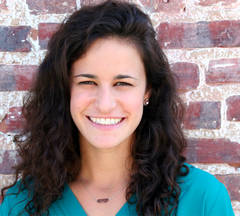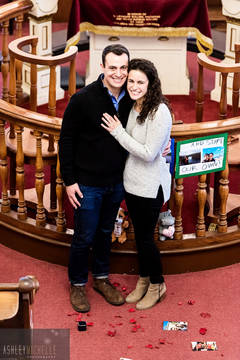B'nai Spotlight - Erika Rief Hornstein
B'nai Spotlight will highlight a range of members of the B'nai Israel family who have a long and deep history with the shul. A new profile will be published at least monthly. Every person has incredible stories. Here you will find a few. Each profile tells the reader something about the member who heads up the profile and offers interesting stories of their family connection to B'nai Israel or shul history. The profile also provides their insights on "belonging" to a community - in short, their "My B'nai Story". We hope you enjoy B'nai Spotlight.
As a child, I reveled in exploring the mounds of treasure in my grandparents’ basement. Striking gold meant finding a Jewish  prayer book with handwriting, revealing something about the person who used it many decades ago. It is no surprise that as a high school student at Beth Tfiloh Community Day School in Baltimore, I took a particular interest in Jewish history. Fast forward to an internship during college in 2012 at the Jewish Museum of Maryland where I once again found myself rummaging through old books. This time, I was searching for a particular book with particular inscriptions. From my recent family history research, I had discovered connections to B’nai Israel Congregation. I was looking for synagogue membership logs to prove it. Sure enough, I found several relatives names written in Yiddish, listed as members in the early 1900s.
prayer book with handwriting, revealing something about the person who used it many decades ago. It is no surprise that as a high school student at Beth Tfiloh Community Day School in Baltimore, I took a particular interest in Jewish history. Fast forward to an internship during college in 2012 at the Jewish Museum of Maryland where I once again found myself rummaging through old books. This time, I was searching for a particular book with particular inscriptions. From my recent family history research, I had discovered connections to B’nai Israel Congregation. I was looking for synagogue membership logs to prove it. Sure enough, I found several relatives names written in Yiddish, listed as members in the early 1900s.
While the discovery generated new leads in my family history story, I never expected the connection to B’nai to matter much. I attended college in Atlanta, and didn’t plan to return to Baltimore any time soon. Little did I know that in 2016 I’d move back to Baltimore for graduate school and B’nai would continue to grow as a place of significance in my life. Before continuing with my story, let me tell you a bit about my original B’nai Israel claim to fame, Simon Rief.
Simon Rief (1861-1927)
My great-great grandfather’s brother Simon was the first Rief in the United States. He quickly made a name for himself as a businessman, philanthropist, and community leader in East Baltimore.
Simon Rief was born June 1861 in Kovno, Lithuania. He came to the United States in 1880, settled in East Baltimore, and was  naturalized as a citizen in 1899. He met and married Rachel Epstein, also from Kovno. Together they had five children, three of whom lived.
naturalized as a citizen in 1899. He met and married Rachel Epstein, also from Kovno. Together they had five children, three of whom lived.
Simon started out his career in the U.S. as a tailor, but soon realized he was better suited for management. He eventually opened up a clothing shop where he took orders for piecework. During the Spanish-American War he made uniforms for the U.S. Army. He suffered a huge financial loss when his partner went to Philadelphia to pick up a payment for a shipment and never returned. Simon also made a living by flipping houses. His wife was upset because every time he’d fix up a house for his own family, a client would grow interested in purchasing it. Their constant movement is evidenced by the different addresses in census and city directory documents (1108 East Pratt Street, 606 Aisquith St, 5 South Broadway, 2101 Linden Ave, 1115 E Baltimore, 1531 E Baltimore, 2 S Bond, 1107 E Baltimore St…etc.). In 1901, he even bid on the Carroll Mansion, which at the time was a dilapidated tenement building (unfortunately, his bid wasn’t accepted). He would also buy unclaimed freight at railroad yards, accumulating several sets of silver and furniture. His wealth enabled him to have a driver for his horse and buggy and be among the first in Baltimore to have gas and electric lights and telephones in his house.
After settling in Baltimore, Simon sponsored other family members to join him in the United States. His brother Moshe (my great-great grandfather) died in Lithuania, leaving behind Moshe’s widow Rose, and her three children. Despite having her own siblings established in various places, Rose chose to move with her three children in 1904 to be with Simon’s family in Baltimore. Records show that Simon sponsored their ship passage. He personally retrieved them from Philadelphia. These records also reported that Simon was worth $10,000 at the time.
Simon was very philanthropic. A Sun Paper article reported that Simon Rief contributed $25 of the founding $64 for Baltimore’s Hebrew Free Loan Association in 1898. His daughter recounted that he borrowed money just to be able to give it to charity. He provided weddings for the girls who worked for him. He insisted on having guests for Shabbat dinner, even when his wife worried there wouldn’t be enough food to eat for the immediate family.
In 1924, Simon served on the Board of Directors for the first year of the Council of Orthodox Jewish Congregations of Baltimore. He helped found the Talmudical Academy and served as the president of B’nai Israel Congregation for 25 years. Sadly, his contributions to the community were cut short when he died on September 4, 1927 at 64 years old of Creeping Paralysis.
Sources:
Family history paper by Janet Abramowitz, June 1978; Baltimore Sun, May 1968; 1900, 1910, 1920 U.S. Census; Laws of Maryland, Chapter 461, 1924; Find A Grave Index 1600s- Current; U.S. City Directories; Baltimore Sun 1901
Understanding Belonging
When I moved back to Baltimore in 2016 for graduate school, I wasn’t quite sure what type of Jewish community I’d find. Having grown up in the suburbs, I knew very little of Jewish life downtown. From my internship at the Jewish Museum, I knew that B’nai Israel was still an active congregation, but not much else. On my first Friday night, I walked through Little Italy, down Lombard Street, and then turned onto Lloyd Street. Though I was a little nervous about being in a new place, thinking that my route traced the same streets Simon and Rose walked gave me some level of comfort.
 The intimate crowd instantly welcomed me into the group. The tight knit young adult community soon became my closest friends. When I suggested hosting a community Shabbat dinner to coincide with a weekend my boyfriend Jon (now husband) and his friends planned to visit Baltimore, others jumped to help me pull off the 40+ person meal. Ever since then, I have been actively engaged in thinking about the future and sustainability of the downtown Jewish community, much like Simon was 100+ years ago.
The intimate crowd instantly welcomed me into the group. The tight knit young adult community soon became my closest friends. When I suggested hosting a community Shabbat dinner to coincide with a weekend my boyfriend Jon (now husband) and his friends planned to visit Baltimore, others jumped to help me pull off the 40+ person meal. Ever since then, I have been actively engaged in thinking about the future and sustainability of the downtown Jewish community, much like Simon was 100+ years ago.
A year later, Jon joined me in Baltimore and experienced a similar connection to the community. With our past, current, and intended future connections to B’nai Israel, Jon selected it as the location to propose. Having developed strong relationships with Rabbi Mintz and his wife Tammy, we chose Rabbi Mintz to marry us. The day before the wedding, we celebrated our aufruf inside B’nai Israel’s walls surrounded by our family, friends, and B’nai community. How special that Jon and I delivered a d’var torah regarding the values that brought us together and kept us connected to B’nai from the same bimah where Simon stood each week for 25 years.
From hosting a book club, to planning holiday events, to hosting Shabbat meals, we love cultivating relationships among those seeking Jewish experiences downtown. While a synagogue is not required to live a Jewish life, having a physical structure for people to gather is critical to facilitating community. Just as important as B’nai Israel was to Simon in the early 1900s, so too is it a place for us to connect spiritually and socially today. And when I go to B’nai on Shabbat mornings, I’m fortunate that I can take a break from davening by rummaging through old books, and come across the tallies of the congregation’s vote to install Simon as synagogue president.